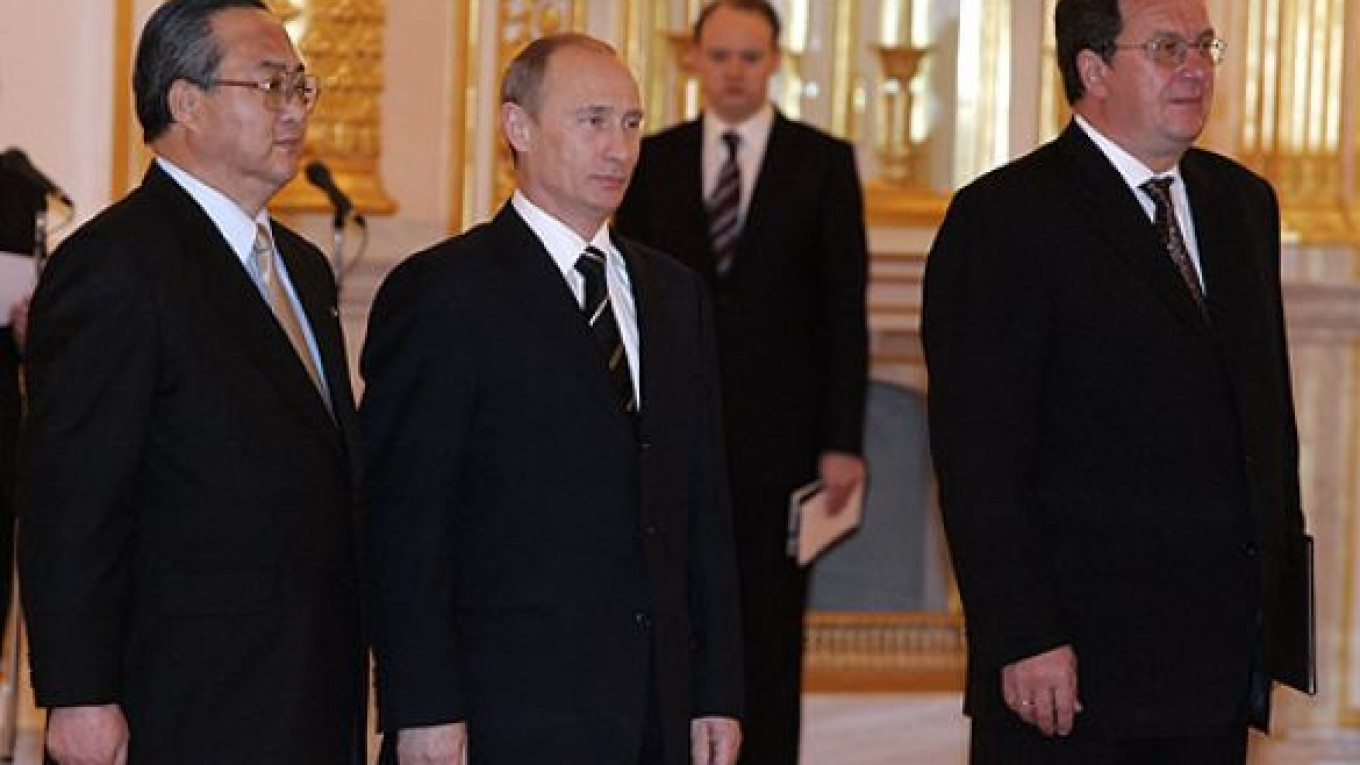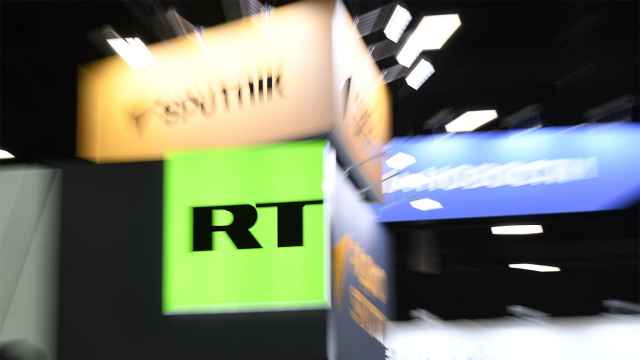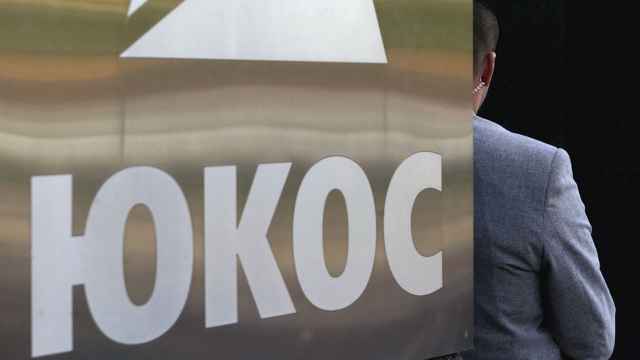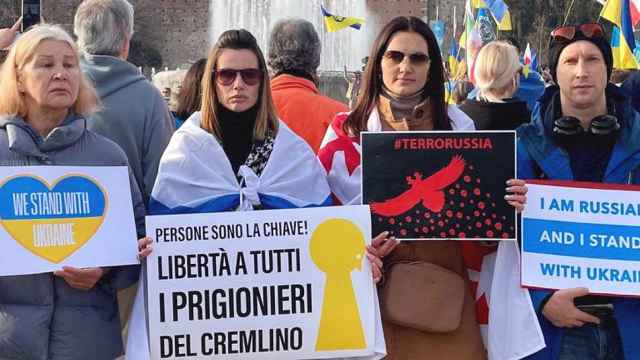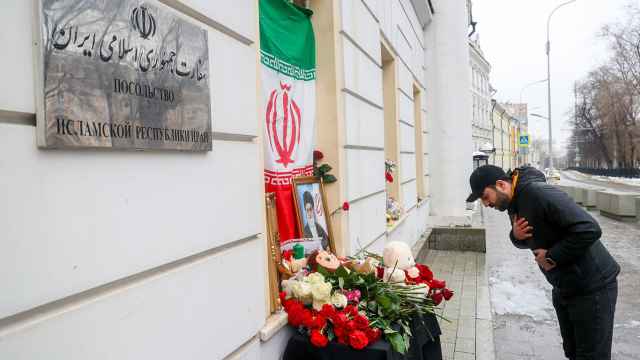Sergei Prikhodko, a foreign policy advisor to Russia's leaders for more than 15 years, has been appointed a deputy prime minister and government chief of staff. He assumes the role of head organizer for a government that has been battered by accusations of poor work in recent months.
Experts described Prikhodko, who had been serving as acting chief of staff, as an experienced technocrat and a strong manager, skills that could help the White House fend off criticism from President Vladimir Putin and take firmer control of wayward ministries.
As chief of staff, he replaces former powerful Kremlin ideologue Vladislav Surkov, who resigned earlier this month after meeting with Putin to discuss the government's progress in carrying out presidential decrees aimed at realizing campaign promises made during Putin's presidential run.
The Kremlin the appointment in an online statement late Wednesday.
Prikhodko, 56, has the rare distinction of having served three presidents, beginning as a foreign policy advisor to then-President Boris Yeltsin in 1997, a role he played for presidents Putin and Medvedev. He moved to the White House last year when the latter became prime minister.
‘He’s not going to conduct any revolutionary activities within the government.’
Alexei Makarkin
Center for Political Technologies
Prikhodko is also former chairman of the board of directors of the Tactical Missiles Corporation, a weapons manufacturer, and aircraft-maker Sukhoi, which produces the Superjet.
Despite his high-level positions, Prikhodko has maintained a decidedly low profile; his name rarely appears in media. “He doesn't get involved in politics. His political views have never been public. He positions himself as a pragmatic technocrat,” said Oleg Matveichev, a former presidential administration official who served concurrently with Prikhodko beginning in the mid-2000s.
Matveichev described Prikhodko, a former diplomat, as a problem-solver with a diplomat's touch. “He was fair and made people feel comfortable. He broke the rules when he thought it was necessary. The results are what mattered,” Matveichev said, recalling Prikhodko in action at an economic forum in Sochi.
“Even given all his years of work, I've never heard any complaints about him,” Matveichev said. “He's not one of those very harsh managers, I don't think he'll use the stick.”
Prikhodko will become chief of staff in a government under fire. Earlier this month, Putin berated the Cabinet for poor execution of his landmark decrees and accused ministers of extending inadequate support to regional authorities and underfunding Far East development.
Putin has also publicly criticized Labor Minister Maxim Topilin, and Education and Science Minister Dmitry Livanov has been the target of an unusual and sustained campaign by lawmakers, including members of the pro-Putin United Russia party, seeking his ouster.
Experts said Prikhodko's diplomatic style and strong ties to both Medvedev and Putin made him an obvious choice for chief of staff, where he'll oversee the government's day-to-day functions, mediating between sparring ministries and keeping the presidential administration satisfied.
“His diplomatic experience could come in handy when interacting with the presidential administration,” said Alexei Makarkin, deputy director of the Center for Political Technologies, who described Prikhodko's appointment as a compromise between the Russian leader and his protege. “He's not going to conduct any revolutionary activities within the government,” Makarkin said by telephone Thursday.
Prikhodko's biggest challenge will be to rein in the ministries, which have gotten “too big for their britches,” Matveichev said. “They give all sorts of excuses, they very often miss deadlines. Sometimes they'll send documents on time that technically meet requirements but are of poor quality,” he said by telephone Thursday.
Makarkin argued that Prikhodko would have to work hard to maintain good relations with the presidential administration, noting that another round of progress assessments — like the ones that apparently led to Surkov's ouster — is expected in the autumn.
Prikhodko's simultaneous appointment to deputy prime minister will give him additional clout, Makarkin said, but it's still unclear what Prikhodko's portfolio will consist of besides foreign affairs, which Medvedev's spokeswoman Natalya Timakova said he will retain, Interfax reported.
Surkov's portfolio, which included the troubled Skolkovo innovation center, a Medvedev-initiated project beset by corruption scandals, was temporarily transferred to Deputy Prime Minister Arkady Dvorkovich after Surkov's resignation.
At least one expert saw Prikhodko's appointment as a stop-gap move to save Medvedev's political hide, with the prime minister's modernization agenda looking increasingly stalled and the liberal reforms of his presidency all but undone by Putin.
“Among more or less heavyweights, people with government experience, any job in Medvedev's Cabinet is a death sentence, especially the job of chief of staff,” said Pavel Salin, director of Financial University's Political Research Center, by telephone Thursday.
In other words, nobody else wanted the job, and Medvedev picked the best candidate from a dwindling list of high-level loyalists, he said.
Contact the author at [email protected]
A Message from The Moscow Times:
Dear readers,
We are facing unprecedented challenges. Russia's Prosecutor General's Office has designated The Moscow Times as an "undesirable" organization, criminalizing our work and putting our staff at risk of prosecution. This follows our earlier unjust labeling as a "foreign agent."
These actions are direct attempts to silence independent journalism in Russia. The authorities claim our work "discredits the decisions of the Russian leadership." We see things differently: we strive to provide accurate, unbiased reporting on Russia.
We, the journalists of The Moscow Times, refuse to be silenced. But to continue our work, we need your help.
Your support, no matter how small, makes a world of difference. If you can, please support us monthly starting from just $2. It's quick to set up, and every contribution makes a significant impact.
By supporting The Moscow Times, you're defending open, independent journalism in the face of repression. Thank you for standing with us.
Remind me later.


